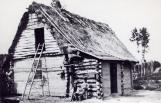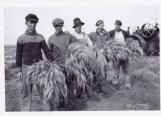1
Maria Vynohradova 's story of her life in the old country, imigrating to Canada, and her early years in Canada.2
Ukrainian home four miles west of Gimli1906
Gimli, Manitoba, Canada
 Credits:
Credits:Manitoba Archives, W. J. Sisler Collection
3
I was born in 1896 in the village of Hushtynka, Borschiwsky District, Ternopil Province, Podilska Post Office. Our family was very poor. My mother was orphaned at nine years of age and grew up on her own. My father was the youngest child in his family, which was also poor. He worked for others. They had a half morg of land when they got married.I had very little schooling. When I was in the first grade, I was involved in an unfortunate accident when a wagon ran over me. After this happened, I was out of school for a whole year. The following year, I could go to school only after the seasonal work was done, so that I didn't have a complete year. Being the eldest, I had to look after the three younger children. When it was time for me to enter the third grade, my father was called up for military duty. I couldn't go to school because I had to look after the children until the time when my father would come home. We attended school in the village of Ivanko.
On one occasion, I asked my teacher, Korol, to let me have a book because I wanted to study. He replied: "Tell your father to sell a bag of wheat, and then you will be able to buy yourself a book." I became quite angry and said to him: "How do you know whether my father has a bag of wheat to sell in order to give me the money to buy a book?"
I never managed to complete the third grade even though I very much wanted to go to school and even dreamed of acquiring a higher education. But my dream was never realized and I had to go to work in the landlord's field when I was nine. I sorted potatoes, weeded the wheat and spread manure in the fields. I was paid ten kreutzers (kreutzer - a hundreth part of an Austrian florin, about one Canadian cent) a day. My mother had to bring me lunch to the field. We worked from sunrise until sunset.
Dmytro Bartko, who became a member of the Ukrainian Labour-Farmer Temple Association when he came to Canada, was one of the wardens, and he frequently gave me responsible work to do. I worked very hard. My mother also used to work in the landlord's fields reaping, digging potatoes and shovelling snow.
It seems that my father entertained radical views. He used to visit the landlord's coachman, Nestor Pawliuk, where he read a newspaper. Whenever my father wanted to know what was happening in the world, he would immediately go to Nestor's. There was a Prosvita community reading room in our village and anyone who wanted to become a member had to pay twenty-two kreutzers in order to be able to use its library. I used to go to the community hall and borrow books which I read aloud because my father enjoyed listening.
There was a drama club in the village of Ivanko which used to put on dramatic performances. It was in this village that I first heard about Taras Shevchenko. The older boys, especially those who had attended secondary school, used to talk to the young people of the village about this poet and his works.
I emigrated for Canada in 1912. We were three girls who left together. My maiden name was Maria Yarow. Five young men were travelling with us. They were avoiding the military draft because they didn't want to serve the Austrian emperor.
We arrived in Hamburg where we stayed for five days waiting for our ship. Since it failed to arrive, our agent sent us on by train to Rotterdam where we obtained passage on the steamer Zelandia. We had a quick crossing and arrived in Canada in nine days. There were many persons aboard this ship who were going to Canada for the second time. One of these was William Zhebretsky. Often these returning immigrants would gather on the deck and carry on lively discussions. I used to listen to what they were saying.
We disembarked in St. John's and it took another four days before we arrived in Winnipeg. I didn't know anyone in Canada. One of the girls who had travelled with us had an aunt in Winnipeg. She was living in a tin shack on Aberdeen Avenue. The immigrants from our village gathered at her place. There were already five others when we two girls arrived and we all lived together in that small shack.
Three days after my arrival in Winnipeg, I found work as a domestic servant. I was paid twelve dollars a month. After that I worked in a communal dining room for which I received fifteen dollars a month. I had to get up at five in the morning and worked until ten at night. Sixty-five persons ate in that dining room. Three of us girls had to prepare everything and wait on the people. I worked about three weeks but couldn't stand it any longer because the work was too much for me, a sixteen-year old girl. I found another job at St. Regis Hotel. When I told the proprietress of the communal kitchen that I was leaving she became angry and wouldn't pay me. She told me that she would pay me only if I completed the month. I left the work all the same and began working at St. Regis Hotel. I worked fewer hours here and was paid twenty dollars a month. Of course, I had to rent a room out of this and pay the street car fare. Being young, I often walked to work.
I kept on looking for better work and was hired at a bakery. After this, I found work as a second cook at the Hudson's Bay Company. I worked there until I married and had a family of my own, and then had to stay home. Then I only did day work as a cleaning woman in rich people's homes.
MARIA VYNOHRADOVA
POINT DOUGLAS, MANITOBA
credits Kobzar Publishing
